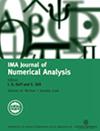Learning a Gaussian mixture for sparsity regularization in inverse problems
IF 2.4
2区 数学
Q1 MATHEMATICS, APPLIED
引用次数: 0
Abstract
In inverse problems it is widely recognized that the incorporation of a sparsity prior yields a regularization effect on the solution. This approach is grounded on the a priori assumption that the unknown can be appropriately represented in a basis with a limited number of significant components while most coefficients are close to zero. This occurrence is frequently observed in real-world scenarios, such as with piecewise smooth signals. In this study we propose a probabilistic sparsity prior formulated as a mixture of degenerate Gaussians, capable of modelling sparsity with respect to a generic basis. Under this premise we design a neural network that can be interpreted as the Bayes estimator for linear inverse problems. Additionally, we put forth both a supervised and an unsupervised training strategy to estimate the parameters of this network. To evaluate the effectiveness of our approach we conduct a numerical comparison with commonly employed sparsity-promoting regularization techniques, namely Least Absolute Shrinkage and Selection Operator (LASSO), group LASSO, iterative hard thresholding and sparse coding/dictionary learning. Notably, our reconstructions consistently exhibit lower mean square error values across all one-dimensional datasets utilized for the comparisons, even in cases where the datasets significantly deviate from a Gaussian mixture model.学习高斯混合稀疏正则化反问题
在反问题中,人们普遍认识到,稀疏性先验的结合会对解产生正则化效应。这种方法基于先验假设,即在大多数系数接近于零的情况下,未知可以在具有有限数量的有效成分的基中适当地表示。这种情况在现实场景中经常观察到,例如分段平滑信号。在这项研究中,我们提出了一个概率稀疏性先验公式作为退化高斯的混合物,能够建模稀疏性相对于一个通用的基础。在此前提下,我们设计了一个神经网络,它可以被解释为线性逆问题的贝叶斯估计。此外,我们提出了一种有监督和无监督的训练策略来估计该网络的参数。为了评估我们的方法的有效性,我们与常用的促进稀疏性的正则化技术进行了数值比较,即最小绝对收缩和选择算子(LASSO),组LASSO,迭代硬阈值和稀疏编码/字典学习。值得注意的是,我们的重建在用于比较的所有一维数据集中始终显示出较低的均方误差值,即使在数据集明显偏离高斯混合模型的情况下也是如此。
本文章由计算机程序翻译,如有差异,请以英文原文为准。
求助全文
约1分钟内获得全文
求助全文
来源期刊
CiteScore
5.30
自引率
4.80%
发文量
79
审稿时长
6-12 weeks
期刊介绍:
The IMA Journal of Numerical Analysis (IMAJNA) publishes original contributions to all fields of numerical analysis; articles will be accepted which treat the theory, development or use of practical algorithms and interactions between these aspects. Occasional survey articles are also published.

 求助内容:
求助内容: 应助结果提醒方式:
应助结果提醒方式:


